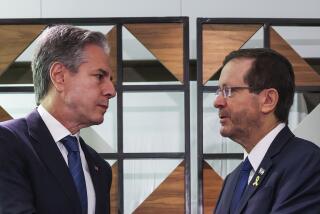Israel Accuses Arabs of Slowing Peace Talks’ Pace : Diplomacy: Prime minister and Cabinet leaders urge neighbors to offer Jerusalem counterproposals.
- Share via
JERUSALEM — Impatient for progress in the Middle East peace negotiations, Israel’s new government on Sunday urged the country’s Arab neighbors to respond more substantively to Jerusalem’s latest proposals, reiterating its readiness to move ahead quickly in those talks.
Prime Minister Yitzhak Rabin, whose center-left government won election in June with a pledge to pursue a land-for-peace resolution of the Arab-Israeli conflict, voiced dismay that Arab negotiators had responded so cautiously to what Jerusalem regarded as significant changes in its position.
Reporting on the talks, which resumed in Washington last Monday, Rabin told the Israeli Cabinet at its weekly meeting Sunday that perhaps the three Arab delegations, representing Syria, Lebanon and Jordan together with the Palestinians, lacked the authority to reply concretely and had thus lapsed into “tired old slogans.”
Foreign Minister Shimon Peres, speaking later with reporters, was blunter: The Arab delegations should “stop complaining (about the Israeli proposals) and come up with counterproposals,” Peres declared.
And Housing Minister Benjamin Ben-Eliezer said the Arabs could lose the momentum that Rabin’s election victory gave the negotiations if they fail to focus on the key issues and move ahead quickly.
“The reality is they waste time on questions we view as unimportant while Israel started the process with (goodwill) gestures and is ready to immediately get into substance,” Ben-Eliezer said after the Cabinet meeting.
“In my assessment, the source of disagreement among Palestinians stems from the absence of a source of authority and the inability to take a leadership decision to sit with us and get into substance,” he added.
Although the latest round of talks began only a week ago and officials here had stressed their “modest expectations” when Jerusalem’s delegation set out for Washington, Israel appears to have hoped for a faster and more positive response from the Arab delegations.
“There is undoubtedly gamesmanship, posturing and propaganda in the Israeli complaints about the lack of Arab enthusiasm just as there was in the Arab attempts to diminish the significance of the Israeli shifts,” said a Western diplomat who follows the negotiations closely.
“But there was also Israeli naivete--an assumption that a new prime minister, a new government and new flexibility would change everything. Israelis felt they were voting for peace when they voted for Rabin, but a 45-year conflict is not resolved in a week.
“Israelis are victims of their own unrealistic expectations if they truly thought a gesture here, a gesture there, their old proposal in a new package and some smiles would change everything.”
Israeli officials are nonetheless disappointed by the lukewarm Palestinian response to a detailed, 33-page proposal for self-rule on the West Bank and Gaza Strip and to a series of goodwill gestures intended to demonstrate the Rabin government’s sincerity and to distinguish it from the hard-line administration of former Prime Minister Yitzhak Shamir, who was defeated in June.
“Instead of expressing thanks for the gestures (including release of 800 detainees last week) and saying, ‘Let’s start talking seriously,’ they are blubbering about what they have not yet received,” a senior politician told Israeli journalists.
While Rabin pledged to give Palestinians limited self-rule within a year in the form of an elected administrative council with limited powers, Palestinians called for a legislative assembly--and a clear indication this will eventually lead to full independence.
Rabin’s new government had changed the tone but not the content of Israel’s positions, Palestinian delegates said at the end of the week.
“We regard the interim period as a bridge between 25 years of Israeli occupation and Palestinian statehood,” Palestinian negotiator Mamdouh Aker said in Washington. “We are not in these talks for self-rule. We are talking about an interim period only to implement (U.N. Resolutions) 242 and 338,” which call for Israeli withdrawal from occupied Arab territory in return for peace.
The cautious Arab response prompted Israel to call leaders of its negotiating teams home for consultations Tuesday, officials said. While other team members continue the talks in Washington, the top negotiators will return to brief Rabin and the Cabinet and discuss their next moves.
Two Palestinian delegates flew to Tunis over the weekend to brief leaders of the Palestine Liberation Organization there and seek instruction on how to proceed.
Urged by the United States not to reject the Israeli proposals out of hand, the Palestinians have posed 35 questions on such issues as the future of laws enacted by Israeli military occupation forces and of land policies that define 65% of the West Bank as “state land,” making it available to Jewish settlers.
Palestinian delegates said they also hoped to discuss their own proposals presented during earlier rounds of talks.
Rabin, speaking to a group of American Jewish fund-raisers Sunday evening, defended Israel’s offer on Palestinian autonomy as in line with the “interim self-government arrangement” put forward in the invitations to the opening talks in Madrid last October.
“We are ready to enter negotiations with the Palestinians,” Rabin said. “We expect them to respond the same way. We offer them elections for administrative councils . . . not the creation of a Palestinian state. We oppose this creation.”
Rabin also voiced doubts that Syria wants full peace with Israel despite progress last week in their bilateral talks in Washington.
“I am not convinced yet that Syria will say ‘yes’ to a full-fledged peace treaty with open boundaries and embassies,” Rabin told the United Jewish Appeal delegation.
More to Read
Sign up for Essential California
The most important California stories and recommendations in your inbox every morning.
You may occasionally receive promotional content from the Los Angeles Times.










